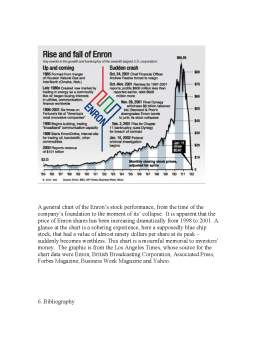Cuprins
- 1. The Enron’s collapse – an introduction
- 2. Brief history of Enron Corporation – the biography of a corporate disaster
- 3. Timeline of Enron’s collapse
- 4. Conclusions – “how can investors and the public protect
- themselves from the Enron’s kind of companies;”
- conclusions drawn from the Enron’s experience.
- 5. The Chart of Enron’s stock performance
- 6. Bibliography
Extras din proiect
1. The Enron’s collapse – an introduction
Enron collapsed because of its’ debt. It was a giant corporation (it fact it was the largest energy company in the world), which did not have much financial resources on its own and depended on outside credit sources to finance its daily operation. In turn its credit-worthiness depended on its performance as reflected in the Enron’s share prices. When the price of Enron’s shares collapsed, so did its’ credit rating. Consequently cash credit to the company became either prohibitively expensive or outright unavailable. Without ready infusions of cash, Enron became unable to meet its earlier credit obligations. This depressed Enron’s stock even deeper, which in turn let to the further decline in already low share prices. Being unable to pay its’ creditors, with no forthcoming offers of merger from its competitors, and with no foreseeable rescue attempt by the government, Enron was forced into bankruptcy. In the purely abstract form, merely for illustrative purposes, we can compare Enron’s debacle with an imaginary individual whose life or at least lifestyle depended much on borrowing - let’s say, it became dependant on loans from credit card companies. Without sufficient income to repay interest on these loans, this hypothetical individual is forced to apply for new credit cards, with which he is paying off his creditors. At some point, when the individual’s credit rating worsens and he or she is no longer able to get more financing from the credit card issuers, the finale becomes inevitable, and usually it is the bankruptcy. We can also compare Enron’s disaster to a pyramid scheme. In the classic pyramid scheme, fraudsters (here Enron’s executives, accounting firms, corporate lawyers and their clique in the government) have to keep their victims happy (in the case of Enron the victims were investors, shareholders, suppliers and the general public) by paying off unrealistic rates of return on victims’ investments (inflated price of Enron’s shares). Pyramid schemes go always bust when a crisis of trust suddenly erupts among creditors or when there are no more victims left to be duped in forking out more money for running the pyramidal operation (i.e., source of credit dries up and the scheme inevitably collapses). We can also liken the Enron’s experience to a market bubble, similar to the spectacular crash of the entire Internet-related sector in the year 2000 or any other historic market bubble from the remote or recent past – more and more cash is pouring into the market (blowing the bubble bigger and bigger) until it finally bursts – proverbial “somebody” cries “fire” or the “king is naked”, a stampede – massive sellout - occurs – and the bubble is gone in an instant. Certainly to equate Enron’s disaster to a private individual living off his or her credit cards or to a simple pyramid scheme or even to the mechanics of an uncomplicated historic market bubble would be to grossly oversimplify the issue. Enron was not a banal investment scheme, it was a strategic company, tightly linked to the US government and to the US energy policy (or lack thereof); a company that was extremely active in the domestic politics of the United States, in the political finance of the country’s two major parties, a company that was an unhesitant player in foreign markets and a bold participant in the international energy politics. Enron was a corporate equivalent of superpower. One of the reasons why people invested in Enron was that the company was considered too big to fail (the blue chip kind of stock, the deceptive safe haven) and was engaged in supposedly safe business of buying and selling energy. Everybody needs electricity and heat nowadays, certainly not everybody needs hand-held computers. The majority of the investors, as well as the public, thought that Enron was a rock-solid business, a kin to the famed Swiss banks or the dividend paying US government; few realized that Enron was a casino, and that an investment in Enron – while could be financially rewarding at a certain point– was a chancy affair. Enron’s collapse also raised painful questions about supposed benefits of the deregulation of the public utilities sector as well as of the role of the free market in the operation of deregulated public utilities and energy suppliers. The obvious problem with the idea of letting free market forces control the fate of the utilities and public energy suppliers (in addition to the fact that the functioning of the entire society depends on these companies’ daily operation, and that historically free markets can experience sudden and violent upsurges and decreases in their activity) is the reality of the energy marketplace, which - unlike other sectors of the economy - is dominated by a few very large companies, whose control of the market is almost absolute, oscillating from the state of oligopoly (control usurped by a few major players) to that of monopoly (the market segment or the entire market in a certain geographic area is controlled by just one entity). In each instance a failure of such an entity, whether induced by market forces or by corporate mismanagement, or alternately by a combination of both factors, could cause a catastrophic impact on the society.
Preview document
Conținut arhivă zip
- Falimentul Enron.doc






























